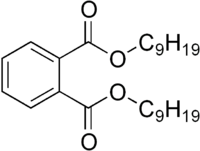Diisononyl phthalate
 | |
| Names | |
|---|---|
| Preferred IUPAC name
Bis(7-methyloctyl) benzene-1,2-dicarboxylate | |
| Other names
Bis(7-methyloctyl) phthalate | |
| Identifiers | |
| 28553-12-0 68515-48-0 | |
| 3D model (Jmol) | Interactive image |
| Abbreviations | DINP |
| ChEBI | CHEBI:35459 |
| ChemSpider | 513622 |
| ECHA InfoCard | 100.044.602 |
| PubChem | 590836 |
| UNII | 4010KIX4CK |
| |
| |
| Properties | |
| C26H42O4 | |
| Molar mass | 418.609 g/mol |
| Appearance | Oily viscous liquid |
| Density | 0.98 g/cm3 |
| Melting point | −43 °C (−45 °F; 230 K) |
| Boiling point | 244 to 252 °C (471 to 486 °F; 517 to 525 K) at 0.7 kPa |
| <0.01 g/mL at 20 °C | |
| Viscosity | 64 to 265 mPa·s |
| Hazards | |
| Flash point | 221 °C (430 °F; 494 K) (c.c.) |
| 380 °C (716 °F; 653 K) | |
| Except where otherwise noted, data are given for materials in their standard state (at 25 °C [77 °F], 100 kPa). | |
| | |
| Infobox references | |
Diisononyl phthalate (DINP) is a phthalate used as a plasticizer. DINP is typically a mixture of chemical compounds consisting of various isononyl esters of phthalic acid.
The European Union has set a maximum specific migration limit from food contact materials of 9 mg/kg food for the sum of diisononyl phthalates and diisodecyl phthalates.[2]
DINP was listed as a substance "known to the State of California to cause cancer" under Proposition 65 legislation on 2013-12-20.[3]
Yet not only for cause of cancer is this substance known. Generally phtalate esters of higher alkanes (or cykloalkanes) (like dipentyl/hexyl/nonyl phthalate etc.) are harmful to organism, because destruction of their esteric bond puts these higher alkane/cykloalcane..etc. into organism, though these molecules are heavily degradable and remain to circulate in veins and cause - for example - reproduction issues.[4] source (in Czech)
See also
References
- ↑ Diisononyl phthalate at Inchem.org
- ↑ "EU legislative list for food contact materials".
- ↑ "State of California, Chemicals known to the state to cause cancer or reproductive toxicity, January 3, 2014" (PDF).
- ↑ Lenka Pohlodková.Estery kyseliny ftalové a jejich vliv na živý organismus: bachelor work. prof. Ing. Alžbeta Jarošová, Ph. D. Brno, Czech republic :2012. http://is.mendelu.cz/zp/portal_zp.pl?prehled=vyhledavani;podrobnosti=44501;download_prace=1
This article is issued from Wikipedia - version of the 9/9/2016. The text is available under the Creative Commons Attribution/Share Alike but additional terms may apply for the media files.